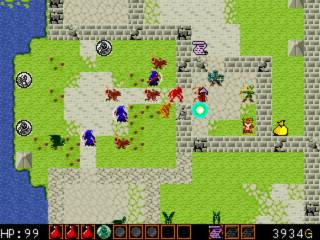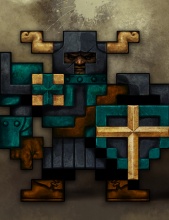Overview
The first game from Magical Time Bean, an independent studio based in California, Soulcaster is a mixture of tower defense and dungeon crawling, along with some role-playing mechanics. The game was released on March 1, 2010 for 240 Microsoft points on the Xbox Live Indie Games marketplace. Soulcaster was very well-received, even by higher profile reviewers, including a 1UP video review and a recommendation from Penny Arcade's Jerry Holkins. A sequel was released in December of the same year, titled Soulcaster II and expanding upon the mechanics of the first game.
The plot of the game follows the titular Soulcaster and his quest in Avericia. The land has been corrupted by the Shadowmaster, and it's up to the Soulcaster and his three Souls to rid the world of him. Shaedu (the archer), Aeox (the warrior), and Bloodfire (the alchemist) all join the Soulcaster as they work together to destroy the Shadowmaster once and for all.
Gameplay
 Soul placement is key in hectic situations.
Soul placement is key in hectic situations.The core concept behind Soulcaster is the ability to summon three different Souls. The player possesses multiple Soul Orbs, which gives the Soulcaster the ability to summon an equivalent amount of Souls. If the player has three Soul Orbs, then three Souls can be summoned at once. There are a total of three different Souls, who all join the Soulcaster early in the game. Each Soul has different strengths and weaknesses, making it necessary to set down a different soul in different situations.
As a magic user, the Soulcaster himself is unable to attack any of the enemies. His Souls have to do all of the fighting for him. The team consists of Shaedu, Aeox, and Bloodfire. Shaedu is a long range archer with a low health stat, and medium attacking power. Shaedu is unable to shoot through friendly units, although he is able to shoot over ravines. Aeox is the strong defensively and offensively balanced Soul. He attacks with a spear, but only when directly next to an enemy. His high defensive stat makes him useful for blocking off areas. Bloodfire has the lowest health stat, but has a high attacking stat due to his usage of explosives. While there are enemies immune to his explosives, Bloodfire is able to lob them over friendly units (unlike Shaedu).
 Aeox is defensively focused and short range.
Aeox is defensively focused and short range.As well as the Souls, the Soulcaster has a lot more at his disposal. There are a few items available in the game, which can be purchased at periodic spots from the game's merchant. The healing item completely restores the Soulcaster's health, and is used automatically when the health points fall below a certain spot. Scrolls of Ruin are essentially bombs, destroying all of the enemies visible on screen. Also available for purchase at merchants are extra Soul Orbs, for a total of five Soul Orbs.
The role-playing aspect of Soulcaster is the ability to purchase upgrades for the three Souls. Each character has three stats that can be upgraded, varying from character to character. Typically these include things such as increased range, better attacking power, higher defense, and faster attacking rate.
 Purchasing upgrades is a key component to the game.
Purchasing upgrades is a key component to the game.The goal in Soulcaster is to complete each room or area, reaching the exit at the end. Rooms contain preset spawn points for enemies (which are destroyed after enough enemies are killed), switches, buttons, or levers to progress through the area, and possibly money and items. In some levels, it is possible to reach the exit before eradicating every enemy, although this is not the case on each area.
Soulcaster is a fairly lengthy game, so reloading saves is handled with a password system (implemented in a patch after the initial release of the game). This password system allows players to save a randomly generated password, and then automatically enter it in to reload the area they were in. It doesn't load the player's exact spot, but starts them over in the room as if they had just entered it. As with many password systems, Soulcaster has several easter eggs hidden in its password system, some of which are unlocked by completing the game's hard mode in under an hour and a half.
Soundtrack
One of the things that Soulcaster got the most praise for was its soundtrack, which is a mixture of rock themes and more orchestral fantasy songs. Upon the release of the second game, the soundtrack was made available for purchase (priced at $5.00 for both soundtracks), while the first two songs were available to stream as a preview.
 The Soulcaster soundtrack
The Soulcaster soundtrack- Soulcaster (00:56)
- Ruins (2:50)
- The Merchant (1:01)
- Dungeon (2:47)
- Glade (00:34)
- Awakening (1:53)
- Quest (2:08)
- Remembrance (00:33)
- Bonus Track - Trailer (2:04)
Log in to comment